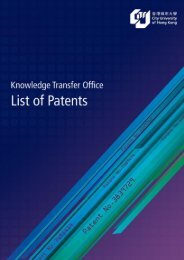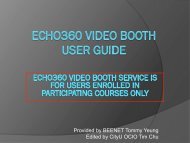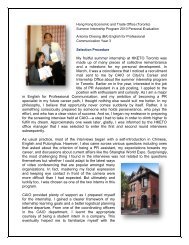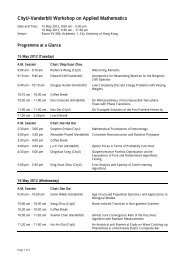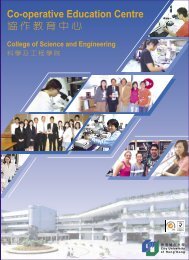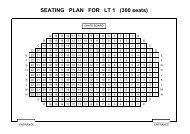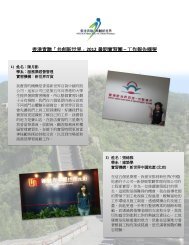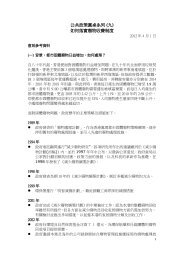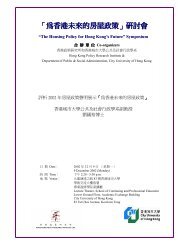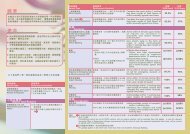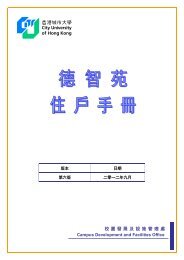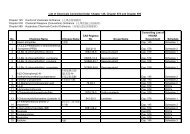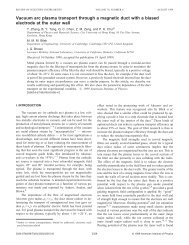BCH1100 Chemistry
BCH1100 Chemistry
BCH1100 Chemistry
- No tags were found...
You also want an ePaper? Increase the reach of your titles
YUMPU automatically turns print PDFs into web optimized ePapers that Google loves.
<strong>BCH1100</strong> <strong>Chemistry</strong>Course Title:<strong>Chemistry</strong>Course Code:<strong>BCH1100</strong>Course Duration: ONE SemesterNo. of Credit Units: 3Level:FoundationPrerequisites:N/APrecursors:N/AEquivalent Courses: NILExclusive Courses: NIL1. Course Aims:This course aims to provide an introduction to the fundamental concepts in <strong>Chemistry</strong> andits importance to the society through discussions on current issues with significant chemicalcontext.Upon completion of this course, students should be able to:a. demonstrate an understanding of the basic concepts and principles of <strong>Chemistry</strong>,b. observe simple chemical reactions and solve calculations on chemical reactions,c. appreciate <strong>Chemistry</strong> and its application in daily life.2. Course Intended Learning Outcomes (CILOs)Upon successful completion of this course, students should be able to:No.CILOs1. Describe and understand the concept of atoms, moleculesand ions, neutrons, protons and electrons, realize theperiodic table, chemical formula and naming, acids andbases, state of matters.2. Rationalize the electronic structures of atoms, ions, andmolecules and chemical compounds through the formationof ionic and covalent bonds.3. Apply the principles of stoichiometry and moles and relatesto mass balance, empirical and molecular formula, andchemical equation.4. Describe and understand the basic principles of chemistryimbedded within current real-world issues, such as qualityof air and water, global warming, acid rain, energyresources, plastics, foods and drugs.5. Correlate the basic principles of chemistry with real-lifeexamples and applicationsWeighting(if applicable)20 %20 %15 %25 %20 %
3. Teaching and learning Activities (TLAs)ILONoCILO 1CILO 2CILO 3CILO 4CILO 5TLAsLectures, interactive questioning and tutorials, and videoswill enable students to recognize the basic knowledge andconcepts and the relationship between them, and give thempractice in explaining these to peers.Lectures, interactive questioning and tutorials, and videoswill enable students to acquire the basic knowledge andconcepts in inorganic and organic chemistry and give thempractice in explaining these to peersLectures, interactive questioning and tutorials, and videoswill enable students to recognize the basic knowledge andconcepts and the relationship between them, and give thempractice in explaining these to peers.Lectures, interactive questioning and tutorials will enablestudents to appreciate the basic knowledge and conceptsimbedded in real-world issues with significant chemicalcontext, and give them practice in explaining these to peers.Lectures, group discussions and literature surveys willenable students to appreciate the basic knowledge andconcepts imbedded in real-world issues with significantchemical context, and give them practice in explaining theseto peers.Hours/week(if applicable)See belowSee belowSee belowSee belowSee below4. Assessment Tasks/ActivitiesILONoCILO 1CILO 2CILO 3CILO 4CILO 5Type of assessment tasks/activitiesExamination, and tutorials and assignmentswith timely feedback, will be used to assesshow well the students can describe and applyimportant concepts in chemistry.Examination, and tutorials and assignmentswith timely feedback, will be used to assesshow well the students can describe and applyimportant concepts in chemistry.Examination, and tutorials and assignmentswith timely feedback, will be used to assesshow well the students can describe and applyimportant concepts in chemistry.Examination, and tutorials and assignmentswith timely feedback, will be used to assesshow well the students can describe and applyimportant concepts in chemistry.Examination, and tutorials and assignmentswith timely feedback, will be used to assessWeighting(if applicable)Refer to thefollowing tablein Section 5Refer to thefollowing tablein Section 5Refer to thefollowing tablein Section 5Refer to thefollowing tablein Section 5Refer to thefollowing tableRemarksSeebelow
how well the students can describe and applyimportant concepts in chemistry.in Section 5Starting from Semester B, 2002-03, undergraduate students must satisfy the following minimum passingrequirements for BCH courses:"A minimum of 30% in coursework as well as examination, in addition to a minimum of 40% in courseworkand examination taken together".5. Grading of Student Achievement: Refer to Grading of Courses in the Academic Regulations (Attachment)and to the Explanatory Notes.Grading will be based on students’ performance in assessment tasks and activities.Allocation of marks will be as follows: Coursework 40% (including tutorials andassignments, peer reviewed quizzes, discussion); examination (2 hrs) 60%.The table below is indicative of the assessment weighting for each CILO.Tutorials & Quizzes Examination TotalAssignmentsCILO 1 5 % 3 % 12 % 20 %CILO 2 5 % 3 % 12 % 20 %CILO 3 5 % 3 % 7 % 15 %CILO 4 5 % 3 % 17 % 25 %CILO 5 5 % 3 % 12 % 20 %Grand Total 25 % 15 % 60 % 100 %Grade DescriptionsThe following description is indicative of the grading criteria adopted for assessment purposes:A. Student completes all assessment tasks/activities and demonstrates excellent grasp of thebasic knowledge and important concepts of chemistry, and can apply these concepts tosolve problems with clear and logical explanations. Shows evidence of demonstrated use ofconcepts for rationalization, with some originality in thought and argument. Displayssuperior writing and presentation skills.B. Student completes all assessment tasks/activities and can describe and explain the basicknowledge and important concepts of chemistry. Shows, to some extent, the ability to useconcepts for rationalization and to solve problems. Displays effective writing andpresentation skills.C. Student completes all assessment tasks/activities and can describe and explain some keyelements of the knowledge and concepts of chemistry. Shows limited ability to applyconcepts, and competent writing and presentation skills.D. Student completes all assessment tasks/activities but only can briefly describe isolatedelements of the knowledge and concepts of chemistry. Demonstrates limited ability inanalysis, with a lack of ability in using and applying concepts. Can communicate simpleknowledge in writing.F. Student fails to complete all assessment tasks/activities and/or cannot accurately describethe knowledge and concepts of some aspects of chemistry. Cannot perform appropriateanalysis, with no ability to apply concepts. May show inability to communicate knowledge.
Keyword Syllabus:Fundamental conceptsMatter and EnergyAtoms, Ions, and the Periodic TableChemical CompoundsChemical CompositionChemical Reactions and EquationsQuantities in Chemical EquationsElectron Structure of the AtomChemical BondingThe Gaseous StateThe Liquid and Solid StatesSolutionsReaction Rates and Chemical EquilibriumAcids and BasesOxidation-Reduction ReactionsNuclear <strong>Chemistry</strong>Organic <strong>Chemistry</strong>Biochemistry<strong>Chemistry</strong> in daily lifeEnergy, <strong>Chemistry</strong>, and SocietyThe Air We BreatheThe <strong>Chemistry</strong> of Global WarmingThe Water We DrinkProtecting the Ozone LayerNeutralizing the Threat of Acid RainEnergy from Electron TransferThe Fires of Nuclear FissionThe World of Plastics and PolymersManipulating Molecules and Designing DrugsNutrition: Food for ThoughtGenetic Engineering and the Molecules of LifeRecommended Reading:Textbook:“Introduction to <strong>Chemistry</strong> – A Conceptual Approach”, 2 nd Edition, R. C. Bauer, J. P. Birk, P. S.Marks, McGraw-Hill (ISBN 9780070172623)Reference book:“<strong>Chemistry</strong> in Context: Applying <strong>Chemistry</strong> to Society”, 6th Edition, L. P. Eubanks, C. H.Middlecamp, C. E. Heltzel, S. W. Keller, McGraw-Hill (ISBN 9780071270137)Teaching pattern:Duration of course: one semesterSuggested lecture/tutorial/laboratory mix:Lectures: 26 HTutorials: 13 H



